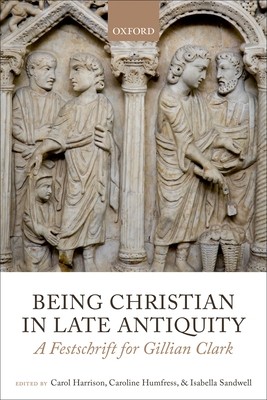
- We will send in 10–14 business days.
- Author: Carol Harrison
- Publisher: Oxford University Press, USA
- ISBN-10: 0199656037
- ISBN-13: 9780199656035
- Format: 16.3 x 24 x 2.3 cm, hardcover
- Language: English
- SAVE -10% with code: EXTRA
Reviews
Description
What do we mean when we talk about "being Christian" in Late Antiquity? This volume brings together sixteen world-leading scholars of ancient Judaism, Christianity, and Greco-Roman culture and society to explore this question, in honor of the ground-breaking scholarship of Professor Gillian Clark. After an introduction to the volume's dedicatee and themes by Averil Cameron, the papers in Section I, "Being Christian through Reading, Writing, and Hearing," analyze the roles that literary genre, writing, reading, hearing, and the literature of the past played in the formation of what it meant to be Christian. The essays in Section II move on to explore how late antique Christians sought to create, maintain, and represent Christian communities: communities that were both "textually created" and "enacted in living realities." Finally in Section III, "The Particularities of Being Christian," the contributions examine what it was to be Christian from a number of different ways of
representing oneself, each of which raises questions about certain kinds of "particularities," for example, gender, location, education, and culture.
EXTRA 10 % discount with code: EXTRA
The promotion ends in 13d.01:28:58
The discount code is valid when purchasing from 10 €. Discounts do not stack.
- Author: Carol Harrison
- Publisher: Oxford University Press, USA
- ISBN-10: 0199656037
- ISBN-13: 9780199656035
- Format: 16.3 x 24 x 2.3 cm, hardcover
- Language: English English
What do we mean when we talk about "being Christian" in Late Antiquity? This volume brings together sixteen world-leading scholars of ancient Judaism, Christianity, and Greco-Roman culture and society to explore this question, in honor of the ground-breaking scholarship of Professor Gillian Clark. After an introduction to the volume's dedicatee and themes by Averil Cameron, the papers in Section I, "Being Christian through Reading, Writing, and Hearing," analyze the roles that literary genre, writing, reading, hearing, and the literature of the past played in the formation of what it meant to be Christian. The essays in Section II move on to explore how late antique Christians sought to create, maintain, and represent Christian communities: communities that were both "textually created" and "enacted in living realities." Finally in Section III, "The Particularities of Being Christian," the contributions examine what it was to be Christian from a number of different ways of
representing oneself, each of which raises questions about certain kinds of "particularities," for example, gender, location, education, and culture.


Reviews